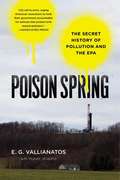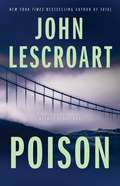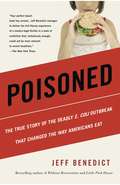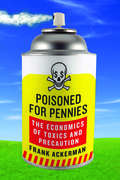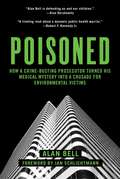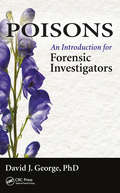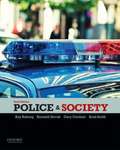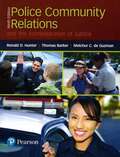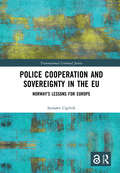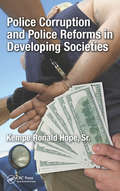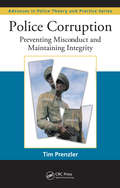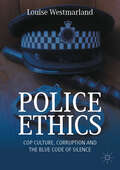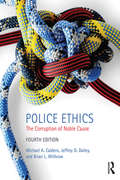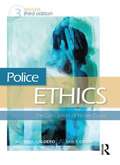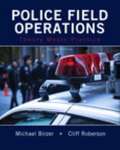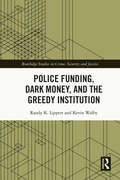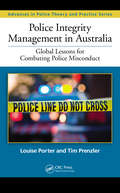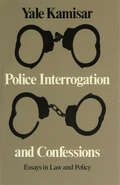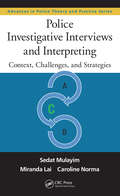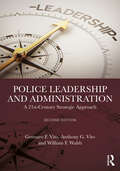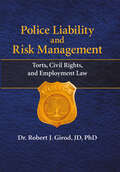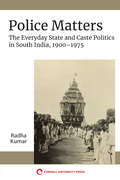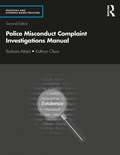- Table View
- List View
Poison Spring: The Secret History of Pollution and the EPA
by Mckay Jenkins E. G. VallianatosWhen you order a meal in a restaurant, you won't find malathion, kelthane or arsenic listed on the menu as an ingredient of your entrée, but these and scores of other pesticides and dangerous chemicals are in the food we eat. They are dumped into the environment where they seep into our water supply and float in the air we breathe. The use of these poisons is approved--or in some cases, simply ignored--by the Environmental Protection Agency. Poison Spring documents, in devastating detail, the EPA's corruption and misuse of science and public trust. In its half-century of existence, the agency has repeatedly reinforced the chemical-industrial complex by endorsing deadly chemicals, botching field investigations, turning a blind eye to toxic disasters, and swallowing the self-serving claims of industry. E. G. Vallianatos, who saw the EPA from the inside for more than two decades with rising dismay, reveals in Poison Spring how the agency has allowed our lands and waters to be poisoned with more toxic chemicals than ever. No one who cares for the natural world, or for the health of future generations, can ignore this powerful exposé.
Poison: A Novel (Dismas Hardy #17)
by John LescroartNEW YORK TIMES BESTSELLING AUTHOR “Lescroart never ceases to amaze his fans. The wit, the timing, the dialogue—everything combines to give this author yet another bestseller and provide readers with a fast-paced, memorable thriller.” —Suspense Magazine “The narrative flows effortlessly and includes a Perry Mason–worthy moment when Hardy manifests a bit of courtroom magic. Lescroart is a perfect choice for readers who enjoy great ensemble casts.” —Booklist In John Lescroart’s latest thriller, San Francisco attorney Dismas Hardy is called upon to investigate the murder of a wealthy man whose heirs are all potential suspects.Dismas Hardy is looking forward to easing into retirement and reconnecting with his family after recovering from two glancing gunshot wounds courtesy of a recent client. But this plan is cut short when, against his wife’s wishes, he is pulled back into the courtroom by the murder of Grant Wagner, the steely owner of a successful family business. The prime suspect is Wagner’s bookkeeper, Abby Jarvis, a former client of Hardy’s who had been receiving large sums of cash under-the-table from the company—but she insists that she’s innocent and Dismas wants to believe her. As he prepares for trial, Dismas probes deeply into the Wagner clan’s history, discovering dark secrets, jealous siblings, gold-digging girlfriends, startling betrayals, and menacing blackmailers. Suspense builds as the trial date looms, and the closer Dismas gets to the Wagners, the clearer it becomes that he has a large target painted on his back. With John Lescroart’s razor-sharp dialogue, intricate plotting and relentless pacing, Poison is a nail-biter that will keep you guessing until the very last page.
Poisoned
by Jeff Benedict"Your perfect beach book has arrived. With Poisoned, Jeff Benedict manages to deliver the full literary experience of a medico-legal thriller in a work of nonfiction that, fortuitously enough, could not be more relevant to recent headlines."-The New York TimesIn this riveting work of narrative nonfiction, award-winning journalist and best-selling author Jeff Benedict chronicles the events surrounding the biggest food-poisoning epidemic in US history and how this unprecedented crisis sparked public awareness about unsanitary practices in the fast food industry. Poisoned draws on access to confidential documents and exclusive interviews with the real-life characters at the center of the drama.Jeff Benedict is considered one of America's top nonfiction writers. He is the author of nine books including bestsellers Little Pink House, Without Reservation, and Pros and Cons. His reporting has been the basis of feature segments on 60 Minutes, ABC's 20/20, Dateline NBC, HBO's Real Sports with Bryant Gumbel, and the Discovery Channel. He is a contributor to Sports Illustrated and the Deseret News, and his articles have been published in The New York Times, Los Angeles Times, Newsweek, and the Hartford Courant. He has a law degree and is a distinguished professor of English at Southern Virginia University.
Poisoned for Pennies: The Economics of Toxics and Precaution
by Frank Ackerman"Cost-benefit analysis" is a term that is used so frequently we rarely stop to think about it. But relying on it can lead to some dubious conclusions, as Frank Ackerman points out in this eye-opening book. For example, some economists have argued that states should encourage--and even subsidize--cigarette smoking by citizens because smoking will shorten life spans and therefore reduce the need and expense of caring for the elderly. How did the economists reach that conclusion? The answer is cost-benefit analysis, Ackerman explains. Then in clear, understandable language, he describes an alternative, precautionary approach to making decisions under uncertainty. Once a mere theory, the precautionary principle has now been applied in practice through the European Union's REACH protocol. Citing major studies, many of which he has directed, he shows that the precautionary approach has not only worked, but has been relatively cheap. Poisoned for Pennies shows how the misuse of cost-benefit analysis is impeding efforts to clean up and protect our environment, especially in the case of toxic chemicals. According to Ackerman, conservatives--in elected office, in state and federal regulatory agencies, and in businesses of every size--have been able to successfully argue that environmental clean-up and protection are simply too expensive. But he proves, that is untrue in case after case. Ackerman is already well known for his carefully reasoned attacks on the conventional wisdom about the costs of environmental regulation. This new book, which finds Ackerman ranging from psychological research to risk analysis to the benefits of aggressive pesticide regulation, and from mad cow disease to lead paint, will further his reputation as a thought leader in environmental protection. We can't afford not to listen to him.
Poisoned: How a Crime-Busting Prosecutor Turned His Medical Mystery into a Crusade for Environmental Victims
by Alan Bell Jan SchlichtmannAfter years of prosecuting hard-core criminals, rising legal star Alan Bell took a private sector job in South Florida’s newest skyscraper. Suddenly, he suffered such bizarre medical symptoms, doctors suspected he’d been poisoned by the Mafia. Bell’s rapidly declining health forced him to flee his glamorous Miami life to a sterile “bubble” in the remote Arizona desert. As his career and marriage dissolved, Bell pursued medical treatments in a race against time, hoping to stay alive and raise his young daughter, his one desperate reason to keep going. He eventually discovered he wasn’t poisoned by a criminal, but by his office building. His search for a cure led him to discover the horrifying truth: his tragedy was just the tip of the iceberg. Millions of people fall ill and die each year because of toxic chemical exposures—without knowing they’re at risk. Stunned by what he discovered, Bell chose to fight back, turning his plight into an opportunity. Despite his precarious health, he began collaborating with scientists dedicated to raising awareness about this issue. Soon, he also found himself drawn back into the legal field, teaming up with top lawyers fighting for those who had already fallen ill. Both a riveting medical mystery and a cautionary tale, this book puts a human face on the hidden truths behind toxic dangers assaulting us in our everyday environments—and offers practical ways to protect ourselves and our children.
Poisons: An Introduction for Forensic Investigators
by David J. GeorgeA unique book on recognition and investigation of criminal poisoning for investigators of all backgrounds and stages of their careers. Poisons: An Introduction for Forensic Investigators is a concise yet comprehensive overview of toxicants and unanticipated circumstances in which poisoning occurs. This book expands awareness of poisoning possibilities, heightens recognition of the toxic potential of many substances, and provides information to aid in focusing investigations. Poisons discusses life-threatening toxic substances and agents that modify behavior to achieve criminal goals. These include drugs that facilitate sexual assaults and robberies, and those found in medical child abuse and drug-product tampering. More than 230 case studies illustrate both unintentional and intentional poisoning and highlight situations where poisoning may not immediately be apparent. Information is included in pertinent criminal poisoning cases to illustrate the temperament of poisoners, their relationship to victims, their basis for poison selection, and their method of administration. Since Poisons is written by a single author, the discussions, format, educational level, and terminology remain consistent to aid crime scene investigators, homicide detectives, forensic scientists, death investigators, toxicologists, medical examiners, attorneys, and students. The book's more than 650 references are an asset to frame knowledge as well as a resource to return to again and again.
Police & Society, Sixth Edition
by Gary Cordner Brad Smith Roy Roberg Kenneth NovakPolice & Society offers an in-depth and analytical look at the process of policing, from police behavior and organization to operations and historical perspectives. Focusing on the relationship between the police and the community and how it has changed throughout the years, the authors explore the most important theoretical foundations and incisive research on contemporary policing and show how that research is put into practice.
Police Community Relations and the Administration of Justice
by Thomas Barker Melchor De Guzman Ronald HunterPolice-Community Relations and the Administration of Justice, Ninth Edition, continues the theme of citizen participation, emphasizes why it is critical to the effectiveness of the criminal justice system, and addresses the dynamic nature of police-community relations. The book focuses on the importance of and strategies for positive police-community interactions and addresses the internal and external communities the police serve. The text's interdisciplinary approach draws data and discussions from a wide range of disciplines and gives students a well-rounded perspective to help them better understand and practice positive police-community relations. The Ninth Edition includes updated data and references throughout; new ideas for addressing the ongoing changes in police-community relations; new insights on how the police organization fits with the community it serves; enhanced information on the dynamics of policing realities; a look at the different levels of communication and how to improve communications; the relationships between the media and the police; and more.
Police Cooperation and Sovereignty in the EU: Norway’s Lessons for Europe (Transnational Criminal Justice)
by Synnøve UgelvikThe State and the police are traditionally seen as closely connected phenomena. Today, however, rapid EU legal developments mean that European police forces are no longer tied to a specific national legal context or a specific territory in the way they used to be. Norway is not a member of the EU. Or is it? This book shows that although it lacks formal membership status, Norway has become part of almost all of the major EU police cooperation measures and agreements. Not only does this mean that foreign police forces may operate on Norwegian territory and vice versa, but in addition, a wide range of EU regulations and cooperation instruments are incorporated directly into Norwegian law. With the increased focus on international and transnational police cooperation in mind, what does it mean to be a sovereign state in Europe today? This book combines strong legal and theoretical analyses of a specific national system to show how this country is tied to and dependent on a wider international and supranational system of legal rules, technologies and concepts. This makes the book relevant not only for the Norwegian prosecution and police authorities, but also for readers outside Norway interested in exploring how and whether the police as a modern state function has changed through the implementation of international cross-border cooperation mechanisms.
Police Cooperation and Sovereignty in the EU: Norway’s Lessons for Europe (Transnational Criminal Justice)
by Synnøve UgelvikThe State and the police are traditionally seen as closely connected phenomena. Today, however, rapid EU legal developments mean that European police forces are no longer tied to a specific national legal context or a specific territory in the way they used to be. Norway is not a member of the EU. Or is it? This book shows that although it lacks formal membership status, Norway has become part of almost all of the major EU police cooperation measures and agreements. Not only does this mean that foreign police forces may operate on Norwegian territory and vice versa, but in addition, a wide range of EU regulations and cooperation instruments are incorporated directly into Norwegian law. With the increased focus on international and transnational police cooperation in mind, what does it mean to be a sovereign state in Europe today? This book combines strong legal and theoretical analyses of a specific national system to show how this country is tied to and dependent on a wider international and supranational system of legal rules, technologies and concepts. This makes the book relevant not only for the Norwegian prosecution and police authorities, but also for readers outside Norway interested in exploring how and whether the police as a modern state function has changed through the implementation of international cross-border cooperation mechanisms.
Police Corruption and Police Reforms in Developing Societies
by Kempe Ronald Hope Sr.Much of the literature on police corruption and police reforms is dominated by case studies of societies classified as developed. However, under the influence of globalization, developing societies have become a focal point of scholarly interest and examination. Police Corruption and Police Reforms in Developing Societies provides critical analyses
Police Corruption: Preventing Misconduct and Maintaining Integrity (Advances in Police Theory and Practice)
by Tim PrenzlerWhile many police officers undertake their work conforming to the highest ethical standards, the fact remains that unethical police conduct continues to be a recurring problem around the world. With examples from a range of jurisdictions, Police Corruption: Preventing Misconduct and Maintaining Integrity examines the causes of police misconduct and
Police Ethics: Cop Culture, Corruption and the Blue Code of Silence
by Louise Westmarland"This book is an important analysis of how police themselves define and respond to police corruption and wrongdoing. It offers special insights into this hard to research issue because it is based on using similar techniques of study on samples of police over time and in different jurisdictions, all linked by an autoethnographic account by Professor Westmarland — an internationally celebrated expert on the topic — narrating her engagement with the problems of police corruption and culture. This provides a revealing account of variations over time and between places. Clearly and engagingly written this is essential reading for students, scholars, practitioners and policy makers concerned about policing and its legitimacy." -Robert Reiner, Emeritus Professor of Criminology, LSE "This is a lively and fascinating book which places our understanding of policing ethics, integrity and police corruption within a long term timeline. The author traces how a particular research technique within policing studies - the use of 'scenario' based surveys of police officers to test officers' attitudes to the seriousness of a series of possible forms of police misconduct and their willingness to report those forms to others - has been utilised in policing research over a 50 plus year history. It begins with US-based pioneering policing research in the 1970s and takes us through the use of, and lessons learnt by, scenario-based research in later decades in the UK and internationally. This includes, by way of an autoethnography, the author's own critical research over the past 20 years, revisiting some earlier published research on the theme. This book is essential reading for those studying police integrity and corruption and the wider field of police cultures." - Professor Steve Savage, Emeritus Professor of Criminology, University of Portsmouth. This book outlines over 20 years of in-depth research on police culture and the blue code of silence which is said to protect and perpetuate police misconduct. It discusses the existing literature and draws upon first-hand research with many serving police officers and some police support staff. These studies not only provide evidence of the police code but are also useful for examining why and how to prevent its ill-effects. A recent (post 1950s) history of police cultural research which concentrates on ethics and integrity is provided with reflections on change and a discussion of the College of Policing&’s introduction of a code of ethics in 2014. It asks whether anything has changed but mainly analyses the individual studies and what the potential lessons learnt are from the various scand
Police Ethics: The Corruption of Noble Cause
by Brian L. Withrow Michael A. Caldero Jeffrey D. DaileyPolice Ethics, Fourth Edition, provides an analysis of corruption in law enforcement organizations. The authors argue that the noble cause—a commitment to “doing something about bad people”—is a central “ends-based” police ethic. This fundamental principle of police ethics can paradoxically open the way to community polarization and increased violence, however, when officers violate the law on behalf of personally held moral values. This book is about the power that police use to do their work and how it can lead police to abuse their positions at the individual and organizational levels. It provides students of policing with a realistic understanding of the kinds of problems they will confront in the practice of police work. This timely new edition offers police administrators direction for developing agency-wide corruption prevention strategies, and a re-written chapter further expands our level of understanding of corruption by covering the Model of Circumstantial Corruptibility in detail. The fourth edition also discusses critical ethical issues relating to the relationship between police departments and minority communities, including Black Lives Matter and other activist groups. In the post-Ferguson environment, this is a crucial text for students, academicians, and law enforcement professionals alike.
Police Ethics: The Corruption of Noble Cause
by John P. Crank Michael A. CalderoThis book provides an examination of noble cause, how it emerges as a fundamental principle of police ethics and how it can provide the basis for corruption. The noble cause -- a commitment to "doing something about bad people" -- is a central "ends-based" police ethic that can be corrupted when officers violate the law on behalf of personally held moral values. This book is about the power that police use to do their work and how it can corrupt police at the individual and organizational levels. It provides students of policing with a realistic understanding of the kinds of problems they will confront in the practice of police work.
Police Field Operations: Theory Meets Practice
by Cliff Roberson Michael L. BirzerPolice Field Operations: Theory Meets Practice, 2/e is a comprehensive, readable text that presents a practical look at police field operations and is designed to be used in one-semester courses on police operations or patrol procedures. Chapters have been designed to be independent units that can be taught individually, but also build upon each other to provide a complete picture of police operations. The text cover all major areas of police operations including patrolling, investigations, crime mapping, community policing, hot pursuit issues, communications, gangs and drugs, and more. Discussions focus on issues and challenges that police officers face on the job and help students bridge the gap between theory and practice.
Police Funding, Dark Money, and the Greedy Institution (Routledge Studies in Crime, Security and Justice)
by Kevin Walby Randy K. LippertPolice Funding, Dark Money, and the Greedy Institution is about a pervasive but little-studied phenomenon. Private funding of public police entails private entities sending resources to police through unconventional or hidden channels, sometimes for suspect reasons. The book argues police acquisition of this "dark money" befits the notion of a "greedy institution" that pursues resources beyond ample public funding and needs, and seeks ever more loyal members beyond its traditional boundaries to reproduce itself. The book focuses on private police foundations, corporate sponsorships, and paid detail arrangements primarily in North America, how these funding networks operate and are framed for audiences, and the forms and volumes of capital they generate. Based on interviews with police representatives, sponsors, funders, and foundation representatives as well as records from over 100 police departments, this book examines key issues in private funding of public police, including corporatization, accountability, corruption, and the rule of law. It documents and analyzes the troubling explosion of police foundations and sponsors and corporate paid detail brokers unknown to the public as a social and policy issue and a hidden response to the global police defunding movement. The book also considers potential policy responses and community safety alternatives in a more generous society. An accessible and compelling read, students and scholars in criminology, criminal justice, law, sociology, political science, anthropology, geography, as well as policymakers, will find this timely book revealing of a neglected, growing area of police practice spanning multiple themes and jurisdictions.
Police Integrity Management in Australia: Global Lessons for Combating Police Misconduct (Advances In Police Theory And Practice Ser.)
by Tim Prenzler Louise PorterIn the past two decades, Australia has been the site of major police misconduct scandals and inquiries, leading to reform initiatives at the cutting edge of police integrity management practices. Presenting interviews with key informants and an analysis of key documents, Police Integrity Management in Australia: Global Lessons for Combating Police
Police Interrogation and American Justice
by Richard A. Leo"Read him his rights." We all recognize this line from cop dramas. But what happens afterward? In this book, Richard Leo sheds light on a little-known corner of our criminal justice system--the police interrogation. Incriminating statements are necessary to solve crimes, but suspects almost never have reason to provide them. Therefore, as Leo shows, crime units have developed sophisticated interrogation methods that rely on persuasion, manipulation, and deception to move a subject from denial to admission, serving to shore up the case against him. Ostensibly aimed at uncovering truth, the structure of interrogation requires that officers act as an arm of the prosecution. Skillful and fair interrogation allows authorities to capture criminals and deter future crime. But Leo draws on extensive research to argue that confessions are inherently suspect and that coercive interrogation has led to false confession and wrongful conviction. He looks at police evidence in the court, the nature and disappearance of the brutal "third degree," the reforms of the mid-twentieth century, and how police can persuade suspects to waive their Miranda rights. An important study of the criminal justice system, Police Interrogation and American Justice raises unsettling questions. How should police be permitted to interrogate when society needs both crime control and due process? How can order be maintained yet justice served?
Police Interrogation and Confessions
by Yale KamisarA historical overview of the Supreme Court's efforts to deal with a most troublesome and most controversial cluster of problems from pre-Miranda days to the present time.
Police Investigative Interviews and Interpreting: Context, Challenges, and Strategies (Advances in Police Theory and Practice)
by Caroline Norma Sedat Mulayim Miranda LaiPolice interviews with suspects and witnesses provide some of the most significant evidence in criminal investigations. Frequently challenging, they require special training and skills. This interaction process is further complicated when the suspect or witness does not speak the same language as the interviewer. A professional reference that can b
Police Leadership and Administration: A 21st-Century Strategic Approach
by Gennaro F. Vito William F. Walsh Anthony G. VitoThis innovative text adapts the strategic management process to the police organizational environment, illustrating how to tailor responses to the unique problems and issues that professionals are likely to face in the field of law enforcement. The authors cover pioneering management techniques for leaders facing the challenges of today’s complex environment, offering police executives guidance on planning, setting direction, developing strategy, assessing internal and external environments, creating learning organizations, and managing and evaluating the change process. The book also tackles how to handle the political, economic, social, and technical considerations that differ from one community to the next. Providing a foundation with which to adapt to an ever-changing criminal justice climate, this book trains leaders to search for solutions rather than relying on old formulas and scientific management principles. It is an essential resource for forward-thinking police leadership courses in colleges and professional training programs.
Police Liability and Risk Management: Torts, Civil Rights, and Employment Law
by Robert J GirodLaw enforcement agencies and their employees are continually at risk for potential liability related to torts, civil rights violations, and employment law issues. Litigation may involve suits by the public against officers and the administration, actions by the administration against officers, or actions by officers against the administration or me
Police Matters: The Everyday State and Caste Politics in South India, 1900–1975
by Radha KumarPolice Matters moves beyond the city to examine the intertwined nature of police and caste in the Tamil countryside. Radha Kumar argues that the colonial police deployed rigid notions of caste in their everyday tasks, refashioning rural identities in a process that has cast long postcolonial shadows.Kumar draws on previously unexplored police archives to enter the dusty streets and market squares where local constables walked, following their gaze and observing their actions towards potential subversives. Station records present a textured view of ordinary interactions between police and society, showing that state coercion was not only exceptional and spectacular; it was also subtle and continuous, woven into everyday life. The colonial police categorized Indian subjects based on caste to ensure the security of agriculture and trade, and thus the smooth running of the economy. Among policemen and among the objects of their coercive gaze, caste became a particularly salient form of identity in the politics of public spaces. Police Matters demonstrates that, without doubt, modern caste politics have both been shaped by, and shaped, state policing.Thanks to generous funding from the Andrew W. Mellon Foundation, through The Sustainable History Monograph Pilot, the ebook editions of this book are available as Open Access volumes from Cornell Open (cornellopen.org) and other repositories.
Police Misconduct Complaint Investigations Manual (Routledge Series on Practical and Evidence-Based Policing)
by Barbara Attard Kathryn OlsonThe Police Misconduct Complaint Investigations Manual provides a timely and unique, step-by-step approach to conducting or reviewing police misconduct investigations, whether a complaint involves a lower level allegation of discourtesy or more serious concerns such as excessive force or criminal behavior. Utilizing real-life examples and updated case law to illustrate points, it provides best practices for investigating police action resulting in misconduct complaints. The Manual’s comprehensive approach includes detailed procedures and policy considerations from intake through case closure, and discusses data tracking, reporting on trends, selecting and training investigative staff, civilian oversight, and a host of special issues that can arise with police misconduct complaints. The Manual is suitable for both sworn personnel and civilians handling or reviewing investigations and whether working internally for a police department or externally in oversight or another capacity. The guidance provides detailed examples of witness interview questions and types of evidence to collect, with discussion on making difficult credibility determinations and approaches to analyzing the information gathered to arrive at a recommended finding. Review questions are found at the end of most chapters, for use in academic or investigative training environments. Police officers engaged in the often complex and challenging work of public safety deserve and expect objective, thorough, and timely handling of complaints. Complainants and other stakeholders seek accountability and transparency when an officer behaves in a way that raises questions about their professionalism. The Complaint Investigations Manual provides instruction on handling misconduct complaints in a manner that will ensure the goals of law enforcement and stakeholders are met. The authors intentionally use a broad approach to make the Manual relevant and easy to use by law enforcement personnel, civilians in oversight or other capacities who work on police misconduct matters, and the criminal justice academic community. It is a critical primer for internal affairs investigators, police managers, law enforcement leaders, auditing professionals, civilian oversight practitioners, government representatives, community advocates, criminal and social justice students, and all others in pursuit of fair, thorough, and timely investigations of police misconduct complaints.
